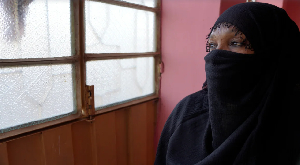Sunyani (B/A), July 16, GNA - Nurse managers in health institutions have been advised to equip themselves with requisite knowledge to ensure that the rights of patients and clients to good quality healthcare are in no way compromised.
Ms. Veronica Darko, Acting Registrar and Chief Executive of the Nurses and Midwives Council for Ghana who gave the advice stressed that such
requisite knowledge in the profession would help the managers to avoid any legal battles in the performance of their duties. She was addressing the close of a two-day workshop organised by the National Secretariat of the Council for 40 participants from both private and public health facilities in Brong-Ahafo in Sunyani. The workshop, the fourth to be organised this year, was under the theme, "Ethical and Legal Issues in Nursing", aimed at updating the knowledge of nurse managers.
The first three workshops were held in the Greater Accra, Eastern and Central Regions.
Ms. Darko said the workshops were part of the Council's functions as mandated by the National Redemption Council (NRC) Decree 117 and Legislative Instrument (LI) 683, to supervise the training and education, as well as to ensure the maintenance and promotion of professional conduct and efficiency of nursing and midwifery.
She added that the code enjoined nurses and midwives to ensure that they act at all times in a manner that safeguards the interests of the individual client or patient.
"This means that nurses and midwives must ensure that no action or inaction on their part is detrimental to the condition or safety of the patient or client," she stressed.
Ms. Darko emphasized that it was important for nurses and midwives to respect confidential information obtained from patients and to refrain from disclosing such information except when the disclosure was required by a court of law or necessary in the public interest. The Acting Registrar listed areas or circumstances that nurse managers could fall foul of legal issues as causing the death of a patient through ignorance, carelessness and negligence, infecting a patient through improper care, giving or administering an overdose of drugs, as well as failure to provide and maintain an environment conductive to the safety and health of the patient.
Ms. Darko noted that with the introduction of the National Health Insurance Scheme, patrons of the scheme who call at hospitals or clinics would demand value for their money and advised the nurse managers to endeavour to staff their facilities with nurses with adequate knowledge and skills.
She advised the managers to address the unfriendly attitude exhibited by some nurses, urging them to impress on their colleagues in the clinical areas to exhibit a pleasant, cheerful and friendly disposition towards all patients at all times.
Ms. Darko announced that the Council had officially permitted three private nursing institutions in the country to go ahead with their functions as training centres for private nursing candidates. They are at Ofankor in Greater Accra, Narh Bita at Tema and Premium Nursing School in Kumasi.
Ms. Pearl Mawusinu Agodzo, Course Prefect, who is a Matron at Drobo Hospital commended the Council "for such educative workshop for nurse managers in the region".
She assured the Council that the participants would not only make better use of what they had been taught at the workshop, but would communicate same to other colleagues at their various stations. The resource persons, Mr. Felix Nyante, Supervising Authority in-charge of Education and Research and Ms. Cecilia Kumapley, in-charge of Public Health Nurse (PHN), all of the Council's Secretariat, respectively took the managers through Ethical aspect of the subject and Legal Issues. Participants were presented with certificates of participation. July 16 05
Health News of Saturday, 16 July 2005
Source: GNA
















